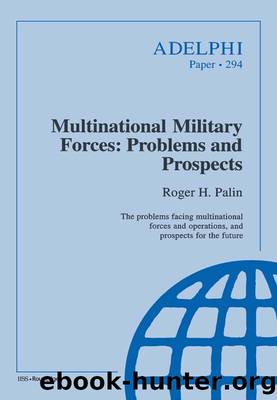Multinational Military Forces by Roger Palin

Author:Roger Palin [Palin, Roger]
Language: eng
Format: epub
Tags: History, Military, General, Strategy, Political Science, Security (National & International)
ISBN: 9781136042324
Google: tcjcAAAAQBAJ
Publisher: Routledge
Published: 2013-09-13T15:58:00+00:00
Deployment
Early and orderly deployment of forces to the theatre is essential to start an operation well. However, for multinational operations this is not always possible. For NATO, deployment has traditionally been a national responsibility and operational control of national forces has not transferred to the NATO commander until the units have arrived in theatre and logistic stocks have been delivered to a certain level. For UN peacekeeping missions the responsibility for deployment lies with UNHQ, but it lacks the means. The situation is compounded both by the fact that very few nations have a military air transport fleet of any size or capacity, and merchant marine fleets have for many years been increasingly flagged offshore.25
National responsibility for deployment means that the international commander has little control over when the assigned forces will arrive in theatre, as the sending cannot always meet his preferred order. The commander thus assumes command of his force in the early, potentially crucial, stages in piecemeal fashion. Given the emphasis placed on rapid-reaction multinational forces in NATO's revised strategic concept, this traditional approach is clearly inadequate. Measures to address the drawbacks of national deployment would have to include greater coordinating authority for multinational commanders; a shift in policy concerning the transfer of authority of the assigned forces linked more closely to the operational need rather than to their arrival in the crisis area; and more comprehensive planning, exercising and evaluation.
For UN operations, UNHQ must rely on nations with the available means to execute the deployment on its behalf on a repayment basis. Given the increased numbers of troops involved in the more recent UN missions, the geographically widespread points of embarkation, and the shortage of indigenous transport resources, this is a slow, complex and very expensive exercise. Currently the UN deploys about 150,000 personnel per year into and out of peacekeeping operations. There is a similar requirement to transport large volumes of freight, not only for the initial deployment, but on a regular basis to support the force. Experience has shown that nations charge the UN considerably more than the commercial rates. A system of dormant contracts, negotiated with appropriate air and shipping agencies in advance and giving access at short notice to transport resources capable of lifting large numbers of troops and their equipment, and large volumes of freight, would speed deployment times, cut costs, and also provide for resupply during the mission's lifetime.26 Establishing a joint-movements coordinating cell as an integral part of the theatre headquarters would also assist.
Download
This site does not store any files on its server. We only index and link to content provided by other sites. Please contact the content providers to delete copyright contents if any and email us, we'll remove relevant links or contents immediately.
The European Opportunity by Felipe Fernández-Armesto(568)
The European History Highway: A Guide to Internet Resources by Dennis A. Trinkle Scott A. Merriman(534)
Morgan Kaufmann Digital Watermarking and Steganography by Ingemar Cox Matthew Miller Jeffrey Bloom Jessica Fridrich Ton(528)
The Seven Wonders of the Ancient World by Michael Denis Higgins(518)
Hyperculture by Byung-Chul Han(504)
European Security in a Global Context by Thierry Tardy(503)
European Security without the Soviet Union by Stuart Croft Phil Williams(501)
The Routledge companion to Christian ethics by D. Stephen Long Rebekah L. Miles(496)
Get Real with Storytime by Julie Dietzel-Glair & Marianne Crandall Follis(443)
Hudud Al-'Alam 'The Regions of the World' - a Persian Geography 372 A.H. (982 AD) by V. V. Minorsky & C. E. Bosworth(436)
Gorbachev And His Generals by William C. Green(427)
Tibetan Studies in Comparative Perspective by Chih-yu Shih Yu-Wen Chen(426)
Governance, Growth and Global Leadership by Espen Moe(417)
How Languages Are Learned 5th Edition by Patsy M Lightbown;Nina Spada; & Nina Spada(406)
CliffsNotes on Fitzgerald's The Great Gatsby by Kate Maurer(398)
The Oxford History of the World by Fernández-Armesto Felipe;(388)
The Egyptian Economy, 1952-2000 by Khalid Ikram(376)
Oral Poetry and Narratives from Central Arabia: The Poetry of Ad-Dindan : A Bedouin Bard in Southern Najd (Studies in Arabic Literature, Vol 17) (English and Arabic Edition) by P. M. Kupershoek P. Marcel Kurpershoek(365)
The Oxford Handbook of the Incas by Sonia Alconini(364)
